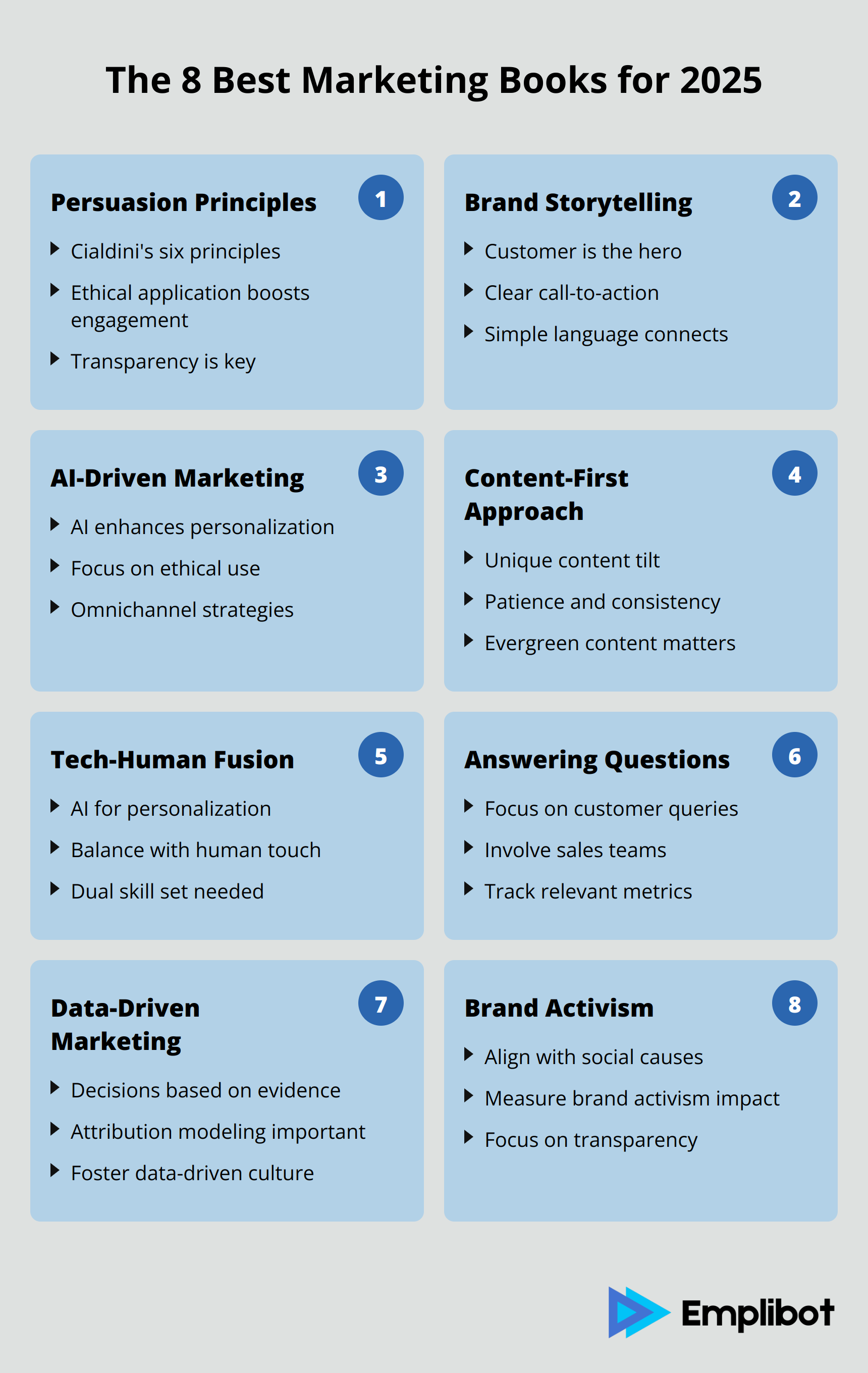Marketing evolves at breakneck speed, and staying ahead requires constant learning. At Emplibot, we’ve curated a list of the best marketing books for 2025 to help you navigate the rapidly changing landscape.
These eight essential reads cover everything from timeless persuasion techniques to cutting-edge digital strategies, ensuring you’re well-equipped for the challenges ahead.
1. Timeless Persuasion Principles for Modern Marketing
Robert Cialdini’s “Influence: The Psychology of Persuasion” remains a cornerstone for marketers in 2025. The book’s six principles of persuasion (reciprocity, commitment and consistency, social proof, authority, liking, and scarcity) apply more than ever in our digital age. Social proof explains why user-generated content and influencer marketing drive consumer behavior. Authority underscores the importance of thought leadership content and expert endorsements in building brand credibility.
Digital marketers can apply these principles ethically to enhance their strategies. Leveraging scarcity in limited-time offers or exclusive content boosts engagement and conversions. An Experian report found that promotional emails conveying a sense of urgency can help increase conversions. However, marketers must use these techniques responsibly. Transparency and genuine value should always lead marketing efforts. Understanding and ethically applying Cialdini’s principles creates more compelling campaigns that resonate with audiences and drive meaningful results.
As we move from timeless persuasion principles to brand storytelling, “Building a StoryBrand” by Donald Miller offers a framework to clarify your message and captivate your audience.
2. Storytelling for Brand Clarity
Donald Miller’s “Building a StoryBrand” revolutionizes business communication. Miller’s framework helps companies craft clear, compelling narratives that resonate with customers. This approach positions the customer as the hero and the brand as the guide, creating marketing messages that truly connect. Building a StoryBrand shows you how to craft a great message, connect with your customers, and boost your revenue by making your value unmistakable.
The StoryBrand method involves several key steps:
- Identify your customer’s problem
- Present your solution
- Create a clear call-to-action
HubSpot found that emails with a single call-to-action increased clicks by 371% and sales by 1617%. Simplicity is paramount; Miller advises using language a fifth-grader could understand (ensuring your message is accessible to all). A clear brand message and customer-first narrative will help you stand out in a crowded marketplace and drive meaningful results.
As we shift our focus from brand storytelling to digital marketing strategies, “Digital Marketing Strategy” by Simon Kingsnorth offers insights into the latest trends and technologies shaping the marketing landscape in 2025.
3. Digital Marketing in 2025: AI-Driven and Omnichannel
Simon Kingsnorth’s “Digital Marketing Strategy” provides essential insights for marketers navigating the complex digital landscape of 2025. Kingsnorth predicts that AI and machine learning will revolutionize personalization, with AI managing 80% of customer interactions. This shift enables marketers to create hyper-targeted campaigns that increase conversion rates by up to 30%. The book emphasizes the importance of ethical AI use, advising marketers to prioritize transparency and data privacy to build trust with consumers.
Kingsnorth also explores successful omnichannel strategies, highlighting the need for seamless customer experiences across all touchpoints. A Harvard Business Review study shows that within six months after an omnichannel shopping experience, customers logged 23% more repeat shopping trips to the retailer’s stores. To implement these strategies effectively, Kingsnorth recommends using customer data platforms (CDPs) to unify data from various sources, enabling real-time personalization across channels. This approach allows businesses to:
- Create consistent brand experiences
- Improve customer retention
- Increase overall revenue
As we move from digital strategies to content-centric business models, Joe Pulizzi’s “Content Inc.” offers valuable insights on building a successful content-first approach.
4. Content-First Strategy for Market Domination
Joe Pulizzi’s “Content Inc.” transforms business models by placing content at the heart of marketing strategies. Pulizzi advocates for a unique content tilt – a specific area of focus where competition is minimal. This approach helps determine how to “tilt” your sweet spot to find a place where little or no competition exists. To monetize content effectively, Pulizzi suggests diversifying revenue streams. The Content Marketing Institute, for example, generates revenue through events (55%), digital advertising (40%), and print (5%).
A content-first strategy demands patience and consistency. Recent research shows that 75% of marketers believe AI-enabled search engines will positively impact their blogs, and 68% predict that their site will get more traffic. To maximize impact, create evergreen content that maintains relevance over time. Moz’s Beginner’s Guide to SEO exemplifies this, with over 3 million views and continued traffic years after publication. Successful content marketing prioritizes value provision over selling, which builds trust and establishes your brand as an industry authority. This approach leads to increased conversions and customer loyalty.
As we transition from content-centric strategies to the future of marketing, Philip Kotler’s “Marketing 5.0” offers insights into the evolving role of technology in shaping customer experiences and brand interactions.
5. Marketing 5.0: The Fusion of Technology and Human Touch
Marketing 5.0: The Fusion of Technology and Human Touch provides a blueprint for navigating the complex intersection of technology and human-centric marketing in 2025. The book is divided into four parts covering 12 chapters that discuss challenges modern marketers face in a digital world and new strategies and tactics. Kotler argues that successful marketers will leverage AI and machine learning to enhance personalization while maintaining authentic human connections. A Salesforce study reveals that 76% of customers expect companies to understand their needs and expectations, underscoring the importance of balancing tech-driven insights with empathetic communication.
The book emphasizes the need for marketers to develop a dual skill set: mastering data analysis and nurturing emotional intelligence. Kotler recommends implementing AI-powered chatbots for routine customer interactions while reserving human agents for complex, emotionally charged situations. This hybrid approach can lead to improved efficiency while meeting customer expectations. To prepare for the future of marketing automation, Kotler advises investing in predictive analytics tools that can forecast customer behavior and preferences.
As we transition from the tech-human balance in Marketing 5.0, we’ll explore how Marcus Sheridan’s “They Ask, You Answer” harnesses customer questions to drive powerful content strategies and inbound marketing success.
6. Answering Customer Questions for Content Success
Marcus Sheridan’s “They Ask, You Answer” transforms content marketing by focusing on customer questions. This approach propelled River Pools and Spas to become the world’s most visited pool website. The book advocates for content that directly addresses customer concerns, increasing trust and conversions. HubSpot’s study reveals that 43% of people admit to skimming blog posts, underscoring the importance of creating engaging, question-based content. Sheridan recommends creating in-depth content for the top 25-30 customer questions, covering topics like pricing, problems, comparisons, reviews, and best-of lists.
This strategy requires company-wide commitment to transparency and education. Sheridan advises involving sales teams in content creation, leveraging their direct customer insights. This collaboration leads to more effective content and shorter sales cycles. To measure ROI, companies should track metrics such as organic traffic growth, lead quality, and sales cycle length. Organizations using this approach report up to 80% shorter sales cycles and 25% higher close rates. Continuous updates and expansion of content based on new customer questions and industry changes maintain relevance and effectiveness.
As we shift our focus from customer-centric content to data-driven marketing strategies, Mark Jeffery’s “Data-Driven Marketing” offers insights into harnessing big data for marketing success.
7. Unleashing the Power of Data-Driven Marketing
Mark Jeffery’s “Data-Driven Marketing” transforms how businesses use big data for marketing success. The book provides a roadmap for data-driven decision-making, enabling marketers to make choices based on evidence rather than intuition. Jeffery emphasizes the importance of key performance indicators (KPIs) in measuring marketing effectiveness. Companies that use marketing analytics report up to 21% higher returns on investment. He recommends focusing on metrics such as:
- Customer lifetime value
- Conversion rates
- Customer acquisition costs
These metrics provide actionable insights for marketers to optimize their strategies.
The book also explores how to optimize marketing spend through advanced analytics techniques. Jeffery advocates for attribution modeling to understand which marketing channels drive the most value, allowing for more efficient budget allocation. A Google study found that data-driven attribution helped marketers grow conversions by 30% to 60% while reducing cost-per-conversion rates. To implement these strategies effectively, Jeffery suggests investing in marketing analytics tools and fostering a data-driven culture within organizations. This approach not only improves marketing ROI but also enhances customer experiences by delivering more relevant and personalized content (a win-win for both businesses and consumers).
As we move from data-driven strategies to purpose-driven marketing, “Brand Activism” by Christian Sarkar and Philip Kotler offers insights into aligning brand values with social causes for business growth.
8. Brand Activism: A Catalyst for Business Growth
Brand Activism by Christian Sarkar and Philip Kotler offers an integrative conceptual framework to posit brand activism as an organisation-driven phenomenon pertaining to the strategic marketing. This shift towards purpose-driven marketing compels businesses to take authentic stands on social, environmental, and political issues. Sarkar and Kotler provide a framework for companies to identify causes that align with their brand values and resonate with their target audience.
The authors stress the importance of measuring brand activism’s impact on business growth. They recommend tracking metrics such as:
- Brand loyalty
- Customer acquisition
- Employee retention
A 2019 Porter Novelli/Cone study presented findings on purpose-driven messaging. To implement effective brand activism strategies, companies should focus on local issues before scaling to larger causes. Transparency and consistency in communicating brand values across all touchpoints are essential for success.
As we conclude our exploration of brand activism, we turn our attention to the key takeaways from these marketing books and their application to your 2025 marketing strategy.

Final Thoughts
The best marketing books for 2025 offer a comprehensive toolkit for modern marketers. These works emphasize the importance of balancing data-driven decision-making with authentic human connections. Marketers must leverage technology while maintaining empathy and understanding of customer needs.
Applying these insights to your 2025 marketing strategy requires a multifaceted approach. You should clarify your brand message, implement AI-driven personalization, develop a content-first approach, and use data-driven techniques to optimize your marketing spend. Consider how your brand can authentically engage in social causes to further strengthen your marketing efforts.
The marketing world constantly evolves, and continuous learning is essential for staying ahead. For businesses looking to streamline their content marketing efforts while staying up-to-date with the latest strategies, Emplibot offers an automated solution that handles content creation and distribution across various platforms.

